Wing-tagging and release of Cinereous, Griffon and Rüppell’s vultures at Jbel Moussa on 17 August 2018. This operation was organised by the Moroccan Forestry Administration (HCEFLCD) in collaboration with a number of national institutions and NGOs.
Cinereous Vulture (Aegypius monachus)
This bird was found at Khmis Anjra, located some 30 Km south of the Strait of Gibraltar. It was taken care of by a farmer for a period of time (more about this later), and on 9 August 2018 it was recovered by our group in collaboration with the Forestry Administration (HCEFLCD – DREF-Rif).
The vulture was wing-tagged with white-code markings on black background (M20). Because it still can’t fly at that moment, it was taken by the Moroccan Association for Falconry and the Conservation of Raptors (AMFCR) to a raptor rehabilitation aviary in Bouznika (with the agreement of the HCEFLCD).

Annually a few Cinereous Vultures cross the Strait of Gibraltar to winter in Morocco, although some of them venture as far south as West Africa. Read more:
- 4 Cinereous Vultures crossing the Strait of Gibraltar in one day (Nov. 2017, all photographed).
- First record of Cinereous Vulture for Mauritania (photo).
- First record of Cinereous Vulture for The Gambia (photo & video).
- Two new records of Cinereous Vulture in Senegal (photos).
Griffon Vulture (Gyps fulvus)
This vulture was ringed and wing-tagged in Portugal by Quercus ANCN. On 08 July 2018, it was found weak at Khouribga and taken care of by a citizen. Alerted by GREPOM, the Forestry Administration (HCEFLCD) recovered the bird three days later. It was then transferred to the facilities of the National Zoological Garden (JZR) for treatment and recovery. On the release day, the HCEFLCD gave the green light to the AMFCR to transport the bird to Jbel Moussa.
The original wing-tags (white ‘X8’ on green background) were almost torn up by the vulture (see photo). Therefore, it was necessary to mark the vulture with new wing-tags (white ‘M19’ on black background).
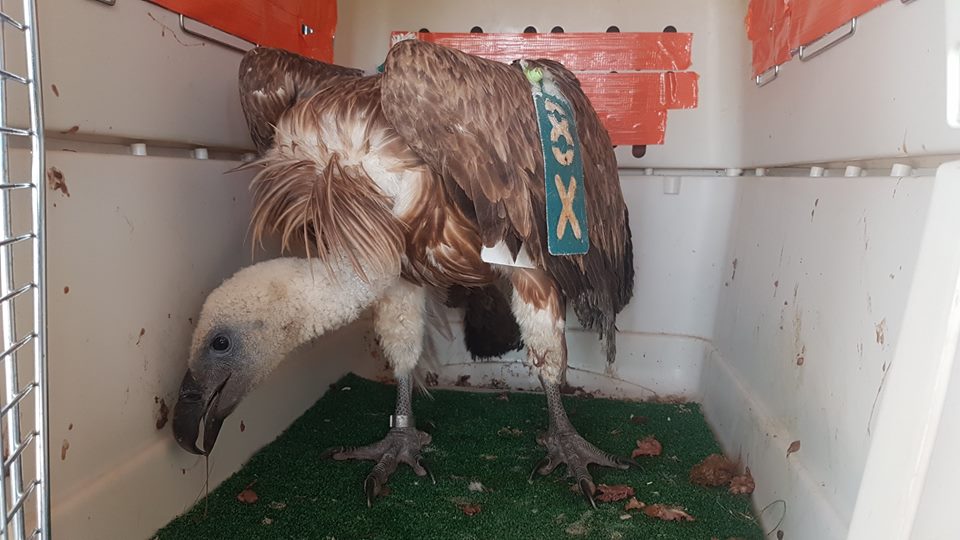
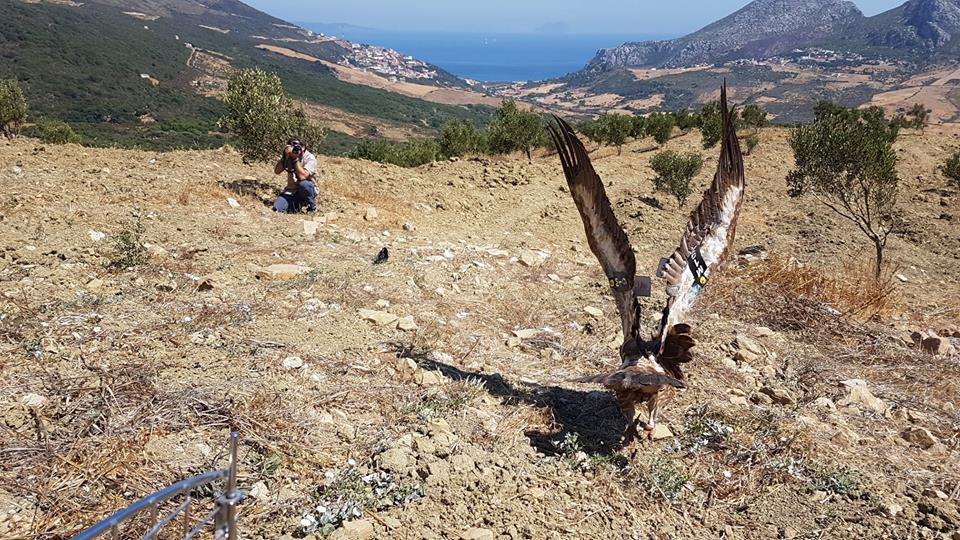
Rüppel’s Vulture (Gyps rueppelli)
This juvenile Rüppell’s Vulture was found weak by a shepherd at Enjil, in the Oriental region on 15 July 2018. It was transferred to the Emirates Center for Wildlife Propagation (ECWP, located at Missour) in collaboration with the Forestry Administration (HCEFLCD – DREF-Oriental). It was wing-tagged (black ‘M1’ on white background) and equipped with a GPS transmitter (photo below), and released at Jbel Moussa with the other vultures (however, it did not flight away immediately after its release).
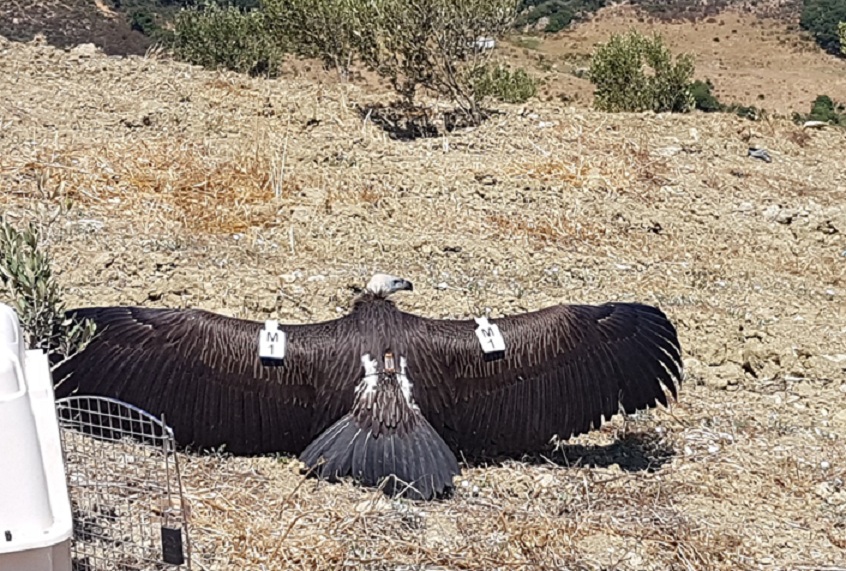
Update concerning M1:
After a few days spent at its release site, the Rüppel’s Vulture headed southwest. It reached the Atlantic coast south of Essaouira in four days by making daily journeys between 70 and 330 kilometers (daily average of 210 km). Unfortunately, its GPS transmitter stopped sending signals on 31 August at Tiguert, near Agadir (see: Monchaux 2018). On 5 September, Ali Irizi of the ASARA association went to the site and found the vulture’ corpse under an electric pylon (second photo below). Without a doubt, the bird was electrocuted. This shows once again that bird mortality in power lines is a real problem. Read more about raptor electrocution:
- Raptor mortality by electrocution in power lines in Morocco (report).
- Identification de la mortalité des rapaces par électrocution au Maroc (rapport).
Read more about this Rüppel’s Vulture in this report (PDF):
Monchaux, G. 2018. Tentative de réhabilitation d’un Vautour de Rüppell. Go-South Bulletin 15: 152-154.
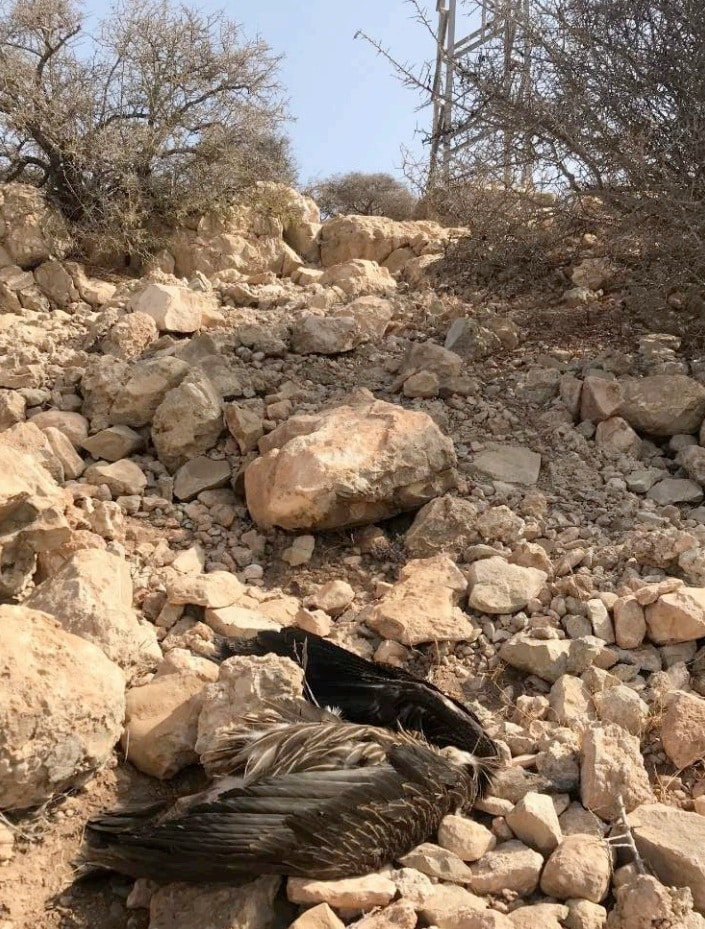
Another Rüppel’s Vulture found by citizens on the roof of a building at Fnideq on 13 August. It was recovered on the same day by our group and the Forestry Administration.
It was meant to be wing-tagged and released on the same day as the other vultures. However, it escaped and flown away two days later. This bird is the 10th Rüppel’s Vulture for “spring 2018” in the area of Jbel Moussa. For the other birds, read: Migration of rare vultures at Jbel Moussa, spring 2018.
(We don’t know for sure if it was migrating north or south when it landed on that roof. However, we know that some vultures still moving northward in August and September).
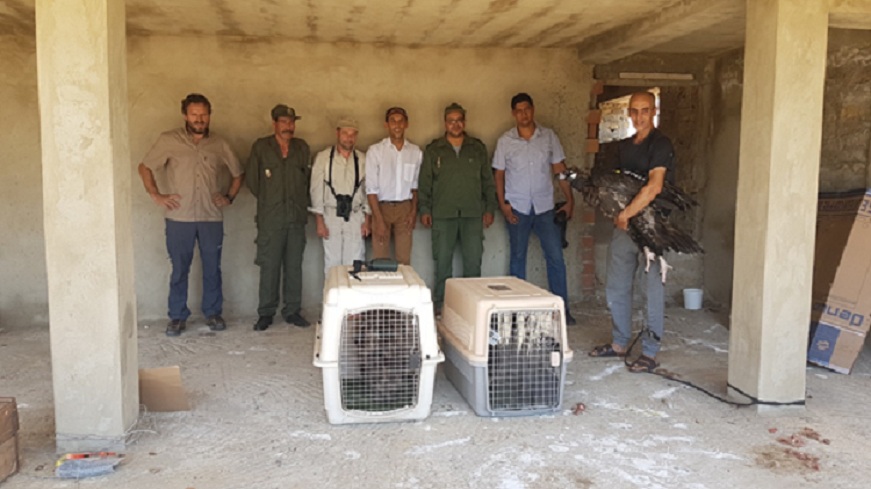
Hello, I just wanted to hear from the X8 vulture which was found in Khouribga in August 2018, because I am the person who saved his life I always keep these photos and the e-mail with the association QUECUS during his stay at me and it is also thanks to the royal gendarmerie which wasted no time in intervening like the waters and the forest which made me dance for 3 days. Regards